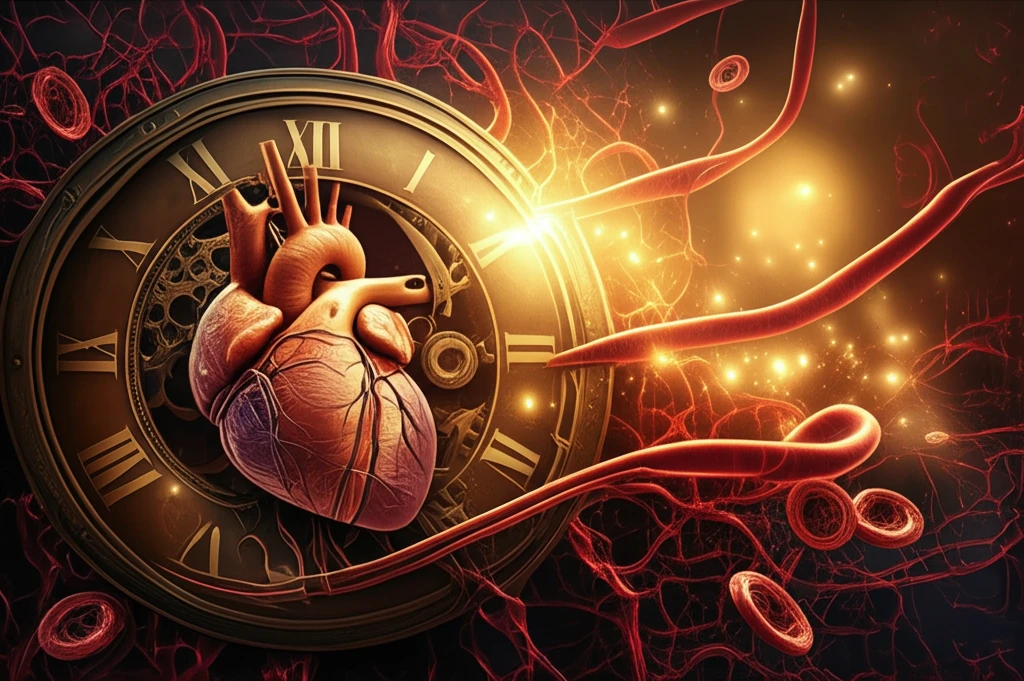
Unlock Your Heart's Rhythm: How Homocysteine Levels Impact Blood Pressure
"Discover the connection between homocysteine, your body's natural clock, and practical steps for a healthier cardiovascular life."
High blood pressure is a major global health challenge, contributing significantly to cardiovascular risk. While the focus is often on the average blood pressure readings, the variability in blood pressure throughout the day and night—known as circadian blood pressure variation—also plays a crucial role in predicting cardiovascular health.
Recent research has shed light on the potential role of homocysteine, an amino acid in the blood, in influencing this circadian rhythm of blood pressure. Studies suggest that elevated levels of homocysteine may disrupt the normal day-night blood pressure fluctuations, potentially increasing the risk of heart-related issues.
This article dives into the findings of a study conducted on Chinese hypertensive adults, exploring the intricate relationship between plasma homocysteine levels and circadian blood pressure variations. We'll break down the key insights and offer practical advice on what these findings mean for your heart health.
The Homocysteine-Blood Pressure Connection

The original research involved analyzing data from a sample of Chinese adults already diagnosed with hypertension. Researchers categorized participants based on their blood pressure dipping status—whether their blood pressure significantly decreased during the night (dippers) or remained relatively stable (nondippers). The study revealed that individuals classified as nondippers tended to have higher levels of plasma homocysteine compared to dippers.
- Higher Homocysteine Levels: Individuals with non-dipping blood pressure status showed significantly higher homocysteine levels.
- Correlation with Nocturnal BP Fall: Elevated homocysteine correlated with reduced nocturnal systolic and diastolic blood pressure fall.
- Independent Risk Factor: Homocysteine was identified as an independent factor associated with non-dipping blood pressure in hypertensive adults.
- Genetic Influence: Certain MTHFR genotypes (TT) were associated with higher rates of non-dipping blood pressure status.
Practical Implications and Future Directions
The findings of this study underscore the importance of managing homocysteine levels as part of a comprehensive approach to cardiovascular health, especially for individuals with hypertension. While further research is needed to fully elucidate the underlying mechanisms and optimal intervention strategies, here are some practical steps you can take: Consult Your Doctor: Discuss your homocysteine levels with your healthcare provider, especially if you have hypertension or other cardiovascular risk factors. Lifestyle Modifications: Emphasize a heart-healthy diet rich in fruits, vegetables, and whole grains. Consider reducing your intake of red meat and processed foods. Folic Acid and B Vitamins: Ensure you're getting adequate amounts of folic acid and other B vitamins, which are essential for homocysteine metabolism. Supplementation may be necessary, but always consult your doctor first. Regular Exercise: Engage in regular physical activity to support overall cardiovascular health. Monitor Blood Pressure: Regularly monitor your blood pressure, paying attention to both daytime and nighttime readings. By taking proactive steps to manage your homocysteine levels and overall cardiovascular health, you can help unlock your heart's rhythm and reduce your risk of heart-related issues.
